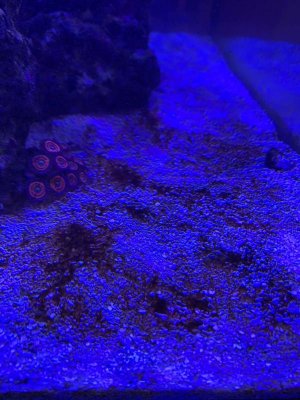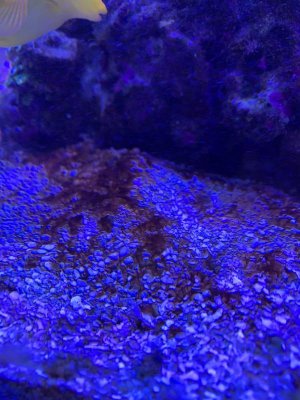I recently moved my 120 gallon tank to a new house. I was having problems at the old house with what looked like dinos, diatoms, or some sort of brown hair algae. It definitely looked like dinos at one point or another, but eventually started to turn more like a brown hair algae. I looked at it under a microscope with another reefer and it looked like Dino Amphidinium, but it seems to have changed since then. I originally tried Vibrant, which seemed to make the problem worse. I then tried Dr. Tims Waste Away with a few days of blackout, which didn't seem to help much. I eventually let things be in hopes that moving the tank would help things.
I had a temporary tank set up at the new house for about 3 months while I slowly set up the main display and acclimated everything. I used new sand but saved the rock from the old tank. The fish and corals have been in the main display for about 3 months now. The tank is looking the same as it did before I moved. Lots of brown algae all over the rocks and sand. It does not particularly look like dinos - it is not stringy and seems to stay when the lights are out at night. It also covers the rocks and looks like some sort of brown hair algae. The tank gets covered in a fairly solid film of algae on the glass within about 2 days. I have 3 powerheads going and lots of flow in the tank.
My tank parameters as of today are: NO3 0-3ppm, PO4 0.012ppm, Alk 7.8, Salinity 1.025, waiting to order Calcium and Magnesium kits.
I am not running any media at the moment. I used to run GFO at the old house but am wondering if the low PO4 and Vibrant caused the dinos in the first place. I am wondering what direction I should go from here.
Questions:
- Do you think the low NO3 and PO4 readings are falsely low due to the algae growth? It seems like the glass gets covered very quickly for having such low nutrients in the tank. Am I better to start feeding heavier and decrease how often the skimmer runs to increase nutrients, or should I start running some GFO and go in the other direction?
- Would the rubbermaid stock tank that I am using as a sump have anything to do with this? I have seen others use them without issue.
- Would a UV make much of a difference?
- Should I try decreasing the intensity of the LEDs? I am running 2 Radion G3s.
Any input is welcome. Thanks for the help.
I had a temporary tank set up at the new house for about 3 months while I slowly set up the main display and acclimated everything. I used new sand but saved the rock from the old tank. The fish and corals have been in the main display for about 3 months now. The tank is looking the same as it did before I moved. Lots of brown algae all over the rocks and sand. It does not particularly look like dinos - it is not stringy and seems to stay when the lights are out at night. It also covers the rocks and looks like some sort of brown hair algae. The tank gets covered in a fairly solid film of algae on the glass within about 2 days. I have 3 powerheads going and lots of flow in the tank.
My tank parameters as of today are: NO3 0-3ppm, PO4 0.012ppm, Alk 7.8, Salinity 1.025, waiting to order Calcium and Magnesium kits.
I am not running any media at the moment. I used to run GFO at the old house but am wondering if the low PO4 and Vibrant caused the dinos in the first place. I am wondering what direction I should go from here.
Questions:
- Do you think the low NO3 and PO4 readings are falsely low due to the algae growth? It seems like the glass gets covered very quickly for having such low nutrients in the tank. Am I better to start feeding heavier and decrease how often the skimmer runs to increase nutrients, or should I start running some GFO and go in the other direction?
- Would the rubbermaid stock tank that I am using as a sump have anything to do with this? I have seen others use them without issue.
- Would a UV make much of a difference?
- Should I try decreasing the intensity of the LEDs? I am running 2 Radion G3s.
Any input is welcome. Thanks for the help.


